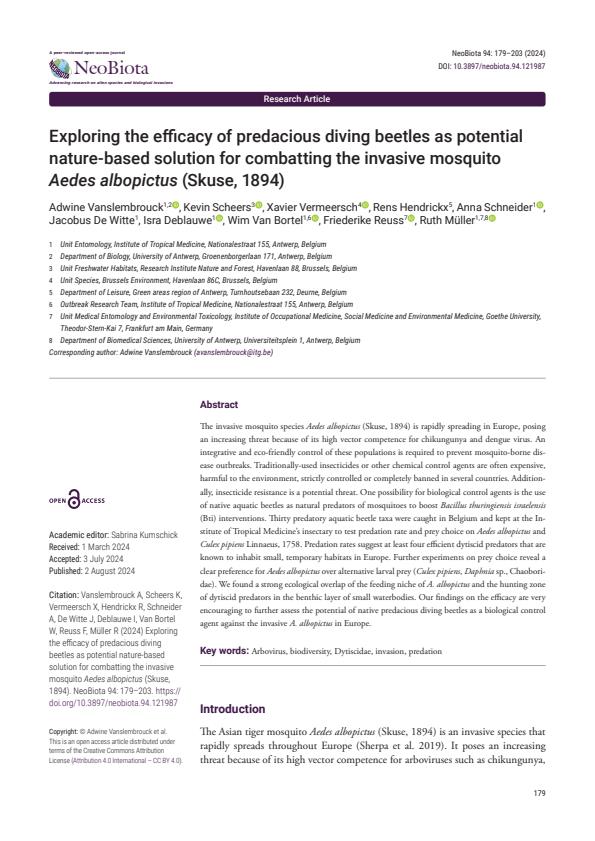Exploring the efficacy of predacious diving beetles as potential nature-based solution for combatting the invasive mosquito Aedes albopictus (Skuse, 1894)
Details
| Number of pages | 25 |
|---|---|
| Volume | 94 |
| Pages (to-from) | 179-203 |
| Type | A1: Web of Science-article |
| Category | Research |
| Magazine | Neobiota |
| Issns | 1619-0033 |
| Publisher | Pensoft Publishers |
| Language | English |
Bibtex
@misc{45e58911-ad83-4372-8638-fb7d8dddaf01,
title = "Exploring the efficacy of predacious diving beetles as potential nature-based solution for combatting the invasive mosquito Aedes albopictus (Skuse, 1894)",
abstract = "The invasive mosquito species Aedes albopictus (Skuse, 1894) is rapidly spreading in Europe, posing an increasing threat because of its high vector competence for chikungunya and dengue virus. An integrative and eco-friendly control of these populations is required to prevent mosquito-borne disease outbreaks. Traditionally-used insecticides or other chemical control agents are often expensive, harmful to the environment, strictly controlled or completely banned in several countries. Additionally, insecticide resistance is a potential threat. One possibility for biological control agents is the use of native aquatic beetles as natural predators of mosquitoes to boost Bacillus thuringiensis israelensis (Bti) interventions. Thirty predatory aquatic beetle taxa were caught in Belgium and kept at the Institute of Tropical Medicine’s insectary to test predation rate and prey choice on Aedes albopictus and Culex pipiens Linnaeus, 1758. Predation rates suggest at least four efficient dytiscid predators that are known to inhabit small, temporary habitats in Europe. Further experiments on prey choice reveal a clear preference for Aedes albopictus over alternative larval prey (Culex pipiens, Daphnia sp., Chaoboridae). We found a strong ecological overlap of the feeding niche of A. albopictus and the hunting zone of dytiscid predators in the benthic layer of small waterbodies. Our findings on the efficacy are very encouraging to further assess the potential of native predacious diving beetles as a biological control agent against the invasive A. albopictus in Europe.",
author = "Adwine Vanslembrouck and Kevin Scheers and Xavier Vermeersch and Rens Hendrickx and Anna Schneider and Jacobus De Witte and Isra Deblauwe and Wim Van Bortel and Friederike Reuss and Ruth Müller",
year = "2024",
month = aug,
day = "02",
doi = "https://doi.org/10.3897/neobiota.94.121987",
language = "English",
publisher = "Pensoft Publishers",
address = "Belgium,
type = "Other"
}
Authors
Adwine VanslembrouckKevin Scheers
Xavier Vermeersch
Rens Hendrickx
Anna Schneider
Jacobus De Witte
Isra Deblauwe
Wim Van Bortel
Friederike Reuss
Ruth Müller

